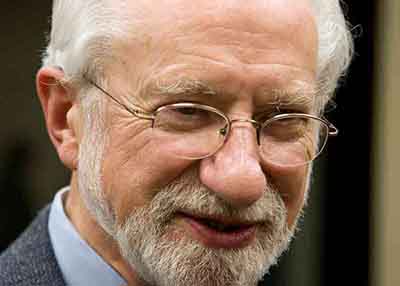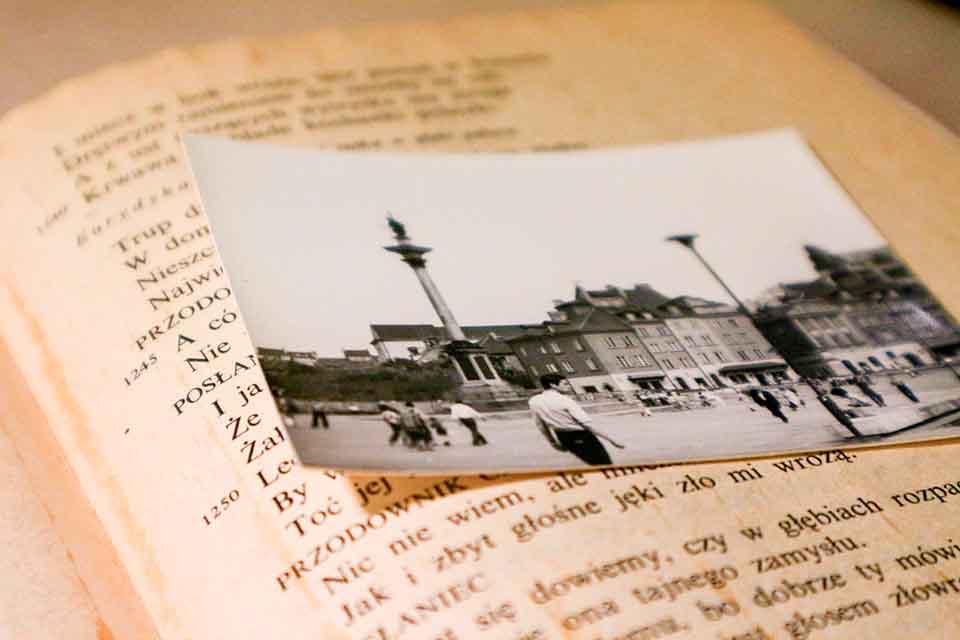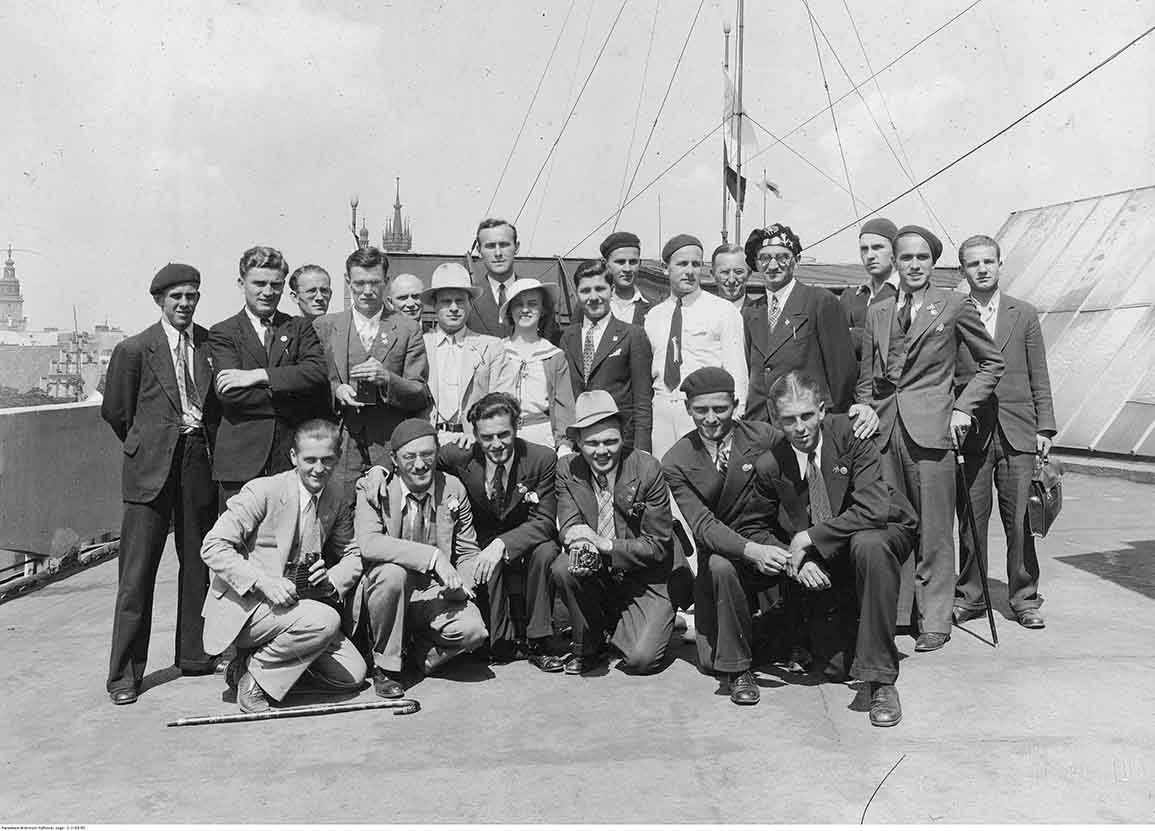Interview with Marek Bober, long-time editor-in-chief of "Kurier Chicago".
Waldemar Biniecki: You were the editor-in-chief of several newspapers in the USA, including: "Polska Gazeta", "Dziennik Chicagowski" and "Kurier Chicago". Your voice will be remembered for a long time from Radio Polonia 2000, and the image of a serious and knowledgeable professional will also be remembered, for example, from the Internet television PNN24TV in Chicago. Who is Marek Bober? Tell us about yourself.
Marek Bober: I found myself in America in the summer of 1986, and in the fall of 1987 I was employed at the then largest Polish newspaper, the New York "Nowy Dziennik". I didn't know much about it, except that it was almost a monopoly on the market. I became the head of the Polish and Polish diaspora department, which in practice meant that I had to fill three pages by myself. The great credit for employing me is due to the then "managing editor", the late Małgorzata Ćwiklińska-Terentiew, later editor-in-chief and owner of "Gwiazda Polarna". The character is controversial, but certainly original and very talented. She was the one who gave me a chance and may she rest in peace.
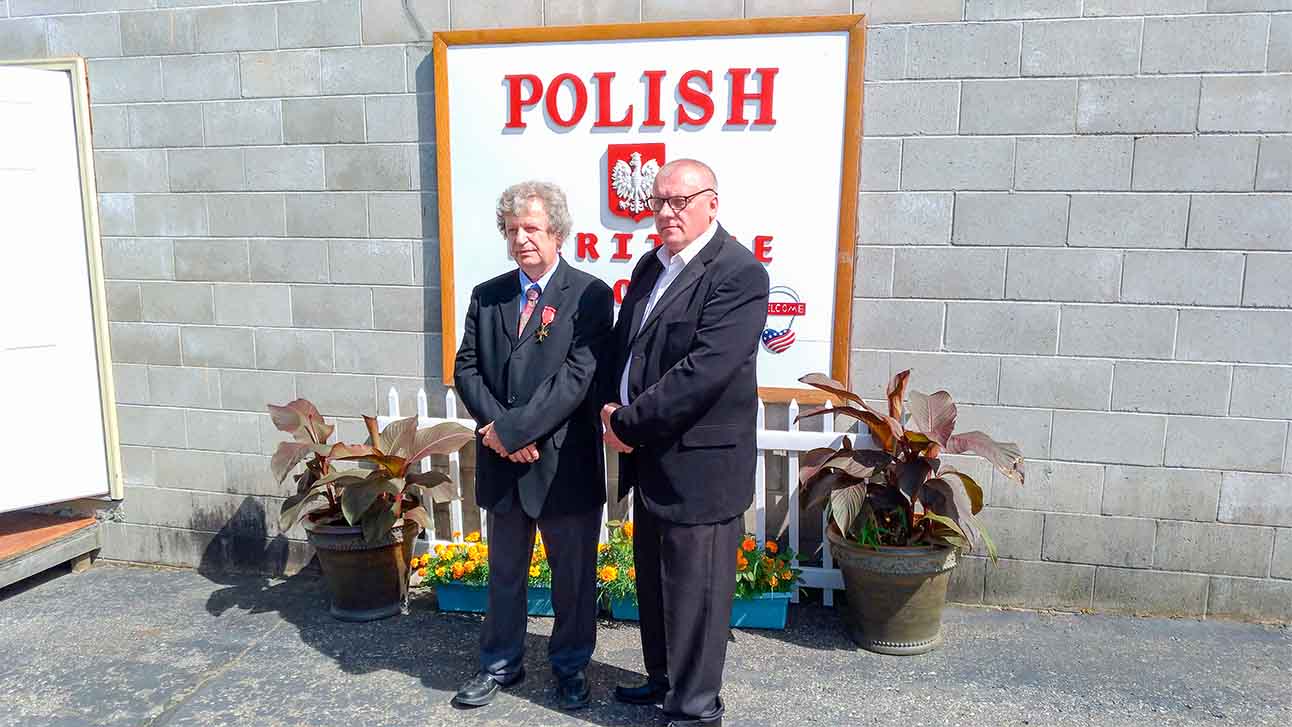
With a friend, editor Edward Dusza (Photo: A. Kogut)
I was young (24), rather inexperienced, but well prepared and I managed. Even though they paid little, you had to be happy. Just recently, I saw bloody clashes with ZOMO on the streets of Nowa Huta and the death of Bogdan Włosik — and now I work in the middle of Manhattan, meet important people and can do something for Poland. You are talking to Budka Suflera and Jacek Fedorowicz. You are talking to Kornel Morawiecki and Mr. and Mrs. Stars. You meet distinguished people who emigrated earlier, such as Minister Wacław Jędrzejewicz and Stanisław Jordanowski, who were active in the Piłsudski Institute. And by the way, you can, which is not possible for everyone, drink vodka with the legendary Ewa Czyżewska, Agnieszka Osiecka, or Marek Nowakowski.
But it wasn't just a time of pleasure. It was also a time of doing politics, and serious politics at that. Such a large newspaper and in such a prestigious place was an institution in itself. This is where important people went, this is where the best publicists sent their materials and this is where significant articles were written. Poland was under a red dictatorship with an uncertain future. There was a fight going on for her. I had a reputation for being a radical. I sympathized with the Confederation of Independent Poland, the Polish Independence Party and Fighting Solidarity. Just before the "round table", they wanted to transfer me to the dispatch department. Apparently it was thought that I would undermine the "compromise" in Poland, which was not what the newspaper's owners wanted. Talks have already taken place in Magdalenka, a "round table" was being prepared. I left, although I would probably be less honorable today. I was simply cut out, a former member of the [communist] Polish United Workers' Party was waiting to take my place.
Soon, together with a group of friends, we started publishing the biweekly "Polska Gazeta". The head of the company was Colonel Marian Gołębiewski, a silent man who was sentenced to death in the first public WiN trial after the war. Marek Ruszczyński, head of the American office of KPN, helped. We published only 13 issues, we made organizational mistakes, but the magazine played a good role in the breakthrough year for Poland in 1989. We were skeptical about the agreements between some of the opposition and the communists. I miss New York a little, but it's probably more about my youth.
"Nowy Dziennik" had its opponents, especially among the "more radical" Polish diaspora, for being too conciliatory in its approach to Polish affairs. On the other hand, it was certainly a newspaper penetrated by the PRL [Communist Poland] agents, which is not surprising because it was an opinion-forming newspaper. Moreover, although many studies have been written about it, including about the editor-in-chief Bolesław Wierzbiański, the truth is still not known to the wider public. The beginnings of the newspaper were different than it is presented — different, because all the credit should not be attributed to Wierzbiański. Connections with the Polish People's Republic agency are omitted. Today it is already known that one of the owners, Bolesław Łaszewski, was a secret collaborator of the [communist] Security Service. We should look at figures such as Romuald Dymski or Jerry Włodarczyk. And Wierzbiański's contacts with the Polish People's Republic intelligence would also be an interesting topic.
WB: And how did you end up in Chicago?
MB: At the end of 1989, information appeared that Michał Kuchejda, a well-known publisher in Chicago, owner of the popular weekly "Relax", was looking for people because he wanted to create a daily newspaper. I arrived at the end of January 1990. The newspaper, "Dziennik Chicagowski", was already published — strangely enough, three times a week, it had only a few pages. There have already been six issues. I was supposed to watch for a month and help a little. But after a week or two I had to manage it. I wasn't at all convinced to stay in Chicago. I didn't know anyone here. Ultimately, before returning to New York, I reached an agreement with the publisher, received money and freedom to create an editorial office. The newspaper quickly rose to prominence, it was modern for those times, it began to be published five times a week, and its volume increased — for a weekend it had 64 pages, and once we made as many as 100 pages. And above all, it had good publicists. A few are still writing today, although they don't admit where they made their debut. From the materials of "Dziennik Chicagowski" we created a weekly newspaper, "Gazeta Polska", which was successfully distributed outside Chicago, mainly in Detroit, and by subscription. Those were good times. After five years, as they say, the collaboration formula ran its course and I left. Perhaps unnecessarily, but there is no point in going back to that.
WB: And the "Chicago Courier" began...
MB: Not right away. Together with Jacek Kawczyński, a great patriot from Chicago, I published four issues of the biweekly "Emigrant". For various reasons, the idea fell apart, which is a pity because the magazine had a chance of success. In January 1997, "Kurier Codzienny" appeared, owned by Adam Ocytko, president of the Association of Polish Clubs. I joined the newspaper in May, and on July 4 I became editor-in-chief. It required many changes, first of all the afternoon school had to be abandoned, because it was a bad idea in this country. I added a lot of pages and created an interesting team. We quickly rose to first place when it comes to daily newspapers. The good streak lasted for several years. In 2008-2009, when the banking and loan crisis began, the market became unsettled. The Internet also did its job. Many Poles returned to Poland or to work in the European Union. There were fewer readers and fewer businesses offering advertisements. We switched to a weekly magazine, already as "Kurier Chicago". And we were at the forefront again for a dozen or so years. In total, the newspaper existed for 25 years. That's a lot. Adam Ocytko died in 2022. An important era for the Polish community in Chicago has ended. "Kurier" was a brave newspaper, it was not afraid of difficult topics. There are many people saying that they miss it.
WB: I remember our conversations with the publisher of "Kurier Chicago", the creator of Polish media, the initiator of many political and social events in Chicago, the former president of the Association of Polish Clubs, Adam Ocytko, and you. At that time, I was a novice journalist also publishing in "Kurier Chicago". Has anyone honored Mr. Adam?
MB: Apart from occasional speeches at the funeral home and during masses – not really. During the funeral mass, the consul read a letter from the president's office, but signed by Minister Adam Kwiatkowski, the current ambassador to the Vatican. This was significant because both of them did not like each other. There were no posthumous awards. Adam Ocytko deserved it most of all, even a high-ranking award. He was not only the president of the Association of Polish Clubs, which he turned into a really strong organization. He saved the May 3rd Parade, which was closed down in 1991 by President Edward Moskal after exactly 100 years of being organized by the Polish National Union. He was not only the owner of a powerful newspaper and a popular radio program. Above all, he was a good man who selflessly helped many people in Poland and America. This aid and charity activity was really great. And he was an honest person.
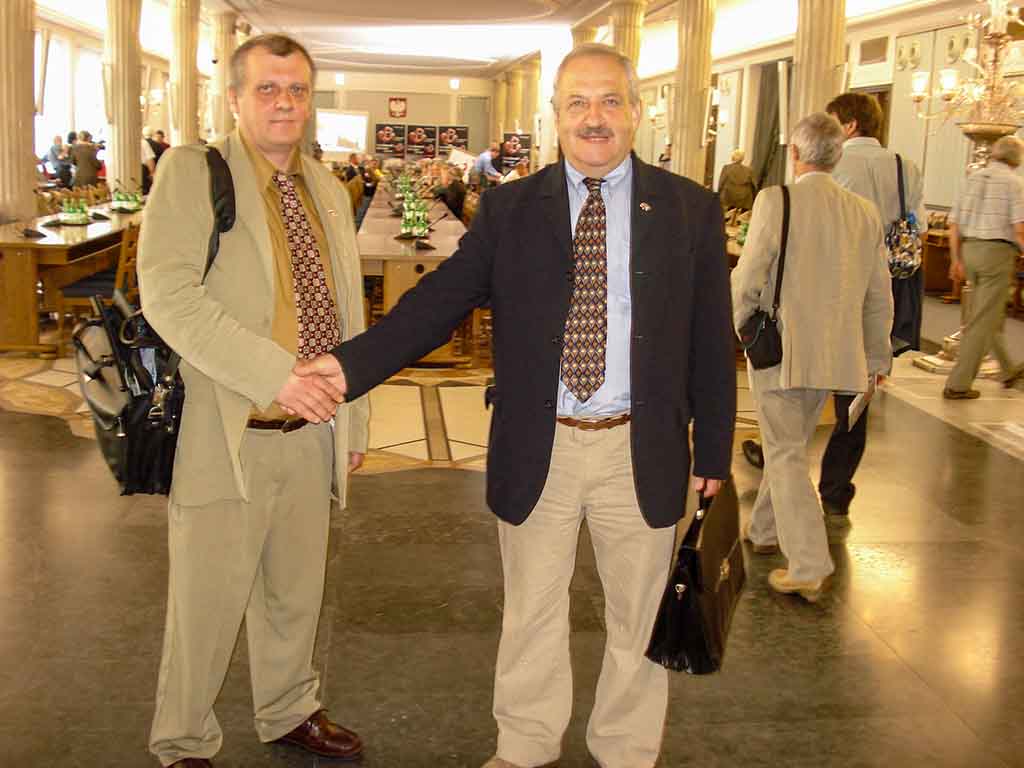
With editor Józef Szaniawski in the Sejm, celebration of the 25th anniversary of Fighting Solidarity, June 2007. (Photo: archive)
WB: The history of Polish journalism and the activities of Polish emigration abroad have a huge tradition. In the United States, it can be safely said that the Polish daily press was founded by "Kuryer Polski", which was published in mid-1888. It was a daily newspaper and for this reason it deserves special attention. In 1935, according to the Consul General of the Republic of Poland in Chicago, Dr. Wacław Gawroński, the Polish diaspora in the USA numbered about 4 million and had a very well-formed elite, including 250 journalists and 90 magazines. The explosion of Polish publishing houses in the USA began in the years 1887-1888, from which time such magazines began to appear, such as: the first magazine in Polish entitled "Echo z Polski" in New York (1863), "Orzeł Polski" (1870), "Kuryer Polski" in Milwaukee, "Dziennik Chicagowski", "Gazeta Polska" in Chicago (1873), "Gazeta Polska Katolicka" in Detroit ( 1873), "Zgoda" (1881), "Pole in America" in Buffalo (1888), "Kurier" in Boston, "Faith and Homeland" (1891), "Wiadomości Codzienne" in Cleveland, "Nation Polski" in Philadelphia ( 1896), "Dziennik Związkowy" in Chicago (1908), "Robotnik Polski" in New York (1908), "Dziennik Polski" in Detroit, "Gwiazda Polarna" in Stevens Point. At the beginning of the 20th century, the circulation of numerous magazines representing all political and social trends of the Polish diaspora was 200,000 copies. "Kultura" is an unrivaled Polish emigration monthly published in the years 1947–2000, initially in Rome, and from 1948 in Paris by the Literary Institute, which was the cultural and political center for Polish emigration after World War II. Such names as Jerzy Giedroych, Józef Mackiewicz, Jan Nowak Jeziorański will remain in Polish history as unrivaled models of Polish emigration thought and emigration journalism. How would you like to comment on this?
MB: Let's leave the very old history behind. We will never live to see the times when, for example, essays at the level of Kazimierz Wierzyński will begin to appear in the émigré or Polish diaspora press. The last large wave of Polish emigration, i.e. the one from the 1980s, brought a revival of the Polish media. Let's not forget that in Chicago there is also radio — a medium that has not developed on a large scale in any other Polish center. About 20 years ago, Indiana University conducted research with full methodology among the Polish community in Chicago and — surprisingly, because these are the times of the Internet — the press was in the first place as a source of obtaining information. But then in Chicago there were — regardless of their quality — three Polish newspapers and several weeklies. The new emigration entered the media and created them. There were many among these people who couldn't do anything in life, especially journalism. There were many schemers or even SB [security service] agents (they still are here today!). But there were also a lot of good people. There was some selection in the press, but not on the radio — there everyone could talk, even if it didn't make sense. New York also had a few weekly newspapers back then, but they basically disappeared quickly.
The Polish community was lucky in that during and after the war, along with the emigration of soldiers, an exceptionally talented group of writers, poets, journalists and publicists arrived. Their influence was visible even at the beginning of the 21st century. The years of the Cold War and later martial law in the Polish People's Republic were primarily characterized by journalism in Radio Free Europe and Voice of America. We had good, sometimes controversial journalism in "Nowy Dziennik", mainly in the supplement "Przegląd Polski". There was also journalism in English in their supplement "New Horizon", as well as in the monthly "Uncaptive Minds" published in New York by Irena Lasota, in which I was also printed. Even Leopold Tyrmand himself wrote in English at that time. The weekly "Gwiazda Polarna" had its good moments. There was also journalism from various organizations and political circles. After all, the monthly magazine of the POMOST movement was full of good texts. Interesting texts, including analyses, were created by the North American Study of Polish Affairs, headed by Jerzy Lerski. It is important that at least some of this journalism reached Poland. At the end of the 1980s, despite its name, the weekly "Relax" added good political texts. Later, "Dziennik Chicagowski" appeared, which at the beginning beat everyone with its journalism. Let's not forget about an excellent monthly magazine, published on a home-made basis, because it was typed, copied and stapled — "Listy do Polaków" (Letters to the Poles) by Czesław Maliszewski from Connecticut. Ambassador Zdzisław Rurarz wrote, the late wrote, as well as a legendary activist of the Silesian "Solidarity" and emigrant — Andrzej Rozpłochowski. The names and titles can be multiplied, but this is a task for historians and archivists.
There was something to read, nothing to be ashamed of. There were polemics, disputes and quarrels. But above all, the level of professionalism was high. There were also journalistic provocations by the Polish People's Republic (PRL) agencies. We don't have that now, because some fragmentary publications, even at the highest level, will not change the one thing: the times of great and good, large-scale emigration journalism are over.
WB: The year 1989, then the development of the Internet and the influence of the Polish media, which appropriates the message, contributes, in my opinion, to the decline of the Polish media abroad. The message of today's émigré media focuses on reporting events from a given city or district where a given medium has subscribers. A similar policy is pursued by Polish organizations, which direct their messages only to members of their organizations. The role of journalists is sometimes played by energetic beauticians and chemically excited DJs. It is worth noting that emigration journalism is in decline and the national media are completely uninterested in the fate of Polish emigration. The creation of any intellectual thought among the Polish diaspora elites is practically zero. It's the smiling selfies that count. The media narrative coming from Warsaw until recently has a clear contribution to this aspect, because the Warsaw media, in my opinion, were too closely intertwined with the party's information policy of the "good change". What do you think about this?
MB: Recently, one of the most important portals in Poland published a report by some stupid young lady who wrote that two million Poles live in Chicago. Such knowledge is passed on next to the Vistula river... Stories about Poles vegetating in Jackowo or Greenpoint, about "Chicago marriages", are history. Writing about the great careers of Poles in the USA is just as well history. In turn, writing about the political power of the 10 million Polish Americans is pointless, because everyone knows that we are political zeros in this country. It has long been recognized in Warsaw that the Polish community is not needed to conduct politics with Washington, and there is a lot of truth in this. The only interesting thread here is the so-called money for the Polish community, because the issue of spending it and many people getting rich from it, if carried out in detail, would be shocking.
The Polish diaspora and Polish emigration became a creation that... the communists wanted. It happened spontaneously and without the involvement of an agent. Due to natural reasons, the politically active soldier emigration disappeared. The time of politically engaged Solidarity emigration is coming to an end. With a lack of leaders, a shallow organization and a lack of vision, we have become an open-air museum. We have become a "cepeliada" that only needs picnics, holy masses, a concert from Poland, a banquet for our own people and — from time to time — collecting money, usually for sick children, because it is a "heartbreaking" topic. The entire sphere of political position and political role in this country was given up without a fight. Well, if this "new" Polonia wants it that way, then so be it. That's why today on the Polish radio in Chicago we have stupid discussions like: should potato pancakes be eaten with sugar or cream? The life of the Polish community has simply become crazy, and have the so-called leaders and the so-called journalists. There is a photo, taken quite seriously a few years ago, of the president of the Polish American Congress (KPA, Kongres Polonii Amerykańskiej), Frank Spula, standing on Cicero Street, where the headquarters of the Polish National Union is located, and handing out donuts to drivers. We had "Fat Tuesday", it's true, but if that's what the role of the president of the KPA boils down to, then it's... maybe comical, but also terrible.
The Polish media are disappearing because they are simply weak. I have worked in the free market for over 30 years and every Polish medium is able to make money as long as it is honest and good. You can make a decent living from this. The Polish press is not a big threat to the Polish media, the Internet and TV are.
It was unfortunate that in the last 20 years, unprepared, often simply stupid, unrefined people entered the Polish media. It's always been like this, but now it's on a bigger scale. When "journalists" came to the Polish radio station on a broker basis, which meant that everyone could buy time and talk into the microphone, it did not mean that it would be a good program. Please believe me, maybe every highlander can drink booze, but not everyone should be on the radio. And contrary to appearances, I'm not talking about highlanders, but generally about people who chose the wrong occupation.
WB: Do the Polish media still have a role to play, in your opinion? Even on the eve of the upcoming most important elections in the world?
MB: The role of the media has not changed and there will always be some. But let's be honest, the current Polish media has no importance in American politics, even local politics. When, at the beginning of 1991, "Dziennik Chicagowski", as the first in the world, published documents from the file of a secret collaborator of the Security Service nicknamed "Bolek", it was a famous case not only in Poland and among the Polish community — it aroused the interest of the largest media and international centers . It was a big, fat deal. When in July 1997 "Kurier Chicago" sent its people to the White House to take advantage of President Bill Clinton's invitation, we knew what to talk about before Poland joined NATO and what the conditions should be. Clinton then promised us that he would raise the matter of Colonel Ryszard Kukliński with the Polish authorities and that it must be resolved positively. Today's Polish media can only walk around the White House. But this is not surprising, after all, because they are of poor quality.
If a man who repairs mobile phones becomes the manager of a radio station, how can it be good? If a man who sold telephone cards becomes the manager of a daily newspaper, what can you expect? Too bad he wants to be a manager — but he wants to be a journalist. Recently he interviewed a lady who represented an organization with a 150-year history. This lady is the secretary and treasurer of this organization. And the journalist from the calling card background began the conversation by asking an inspiring question: what do the treasurer and secretary do? And what is she supposed to do? Or a lady on the radio asks the new consul general what his favorite Christmas Eve dish is. Who cares?! This only shows what kind of people we are dealing with in the media. Pathetic but true.
WB: You were awarded the Pro Patria Medal by the Office of Veterans and Victims of Oppression...
MB: Yes, in December 2023, the Consul General of the Republic of Poland in Chicago, Paweł Zyzak, presented me, but also many other people, with such a distinction. They are awarded for cultivating the memory of the fight for Poland's independence. And it's okay. From a formal point of view, it is a badge awarded by an otherwise respectable office, but not a state decoration, i.e. awarded or approved by the president. It's enough for me. I didn't do catering for the consulate, I didn't play the violin, so I didn't deserve more.
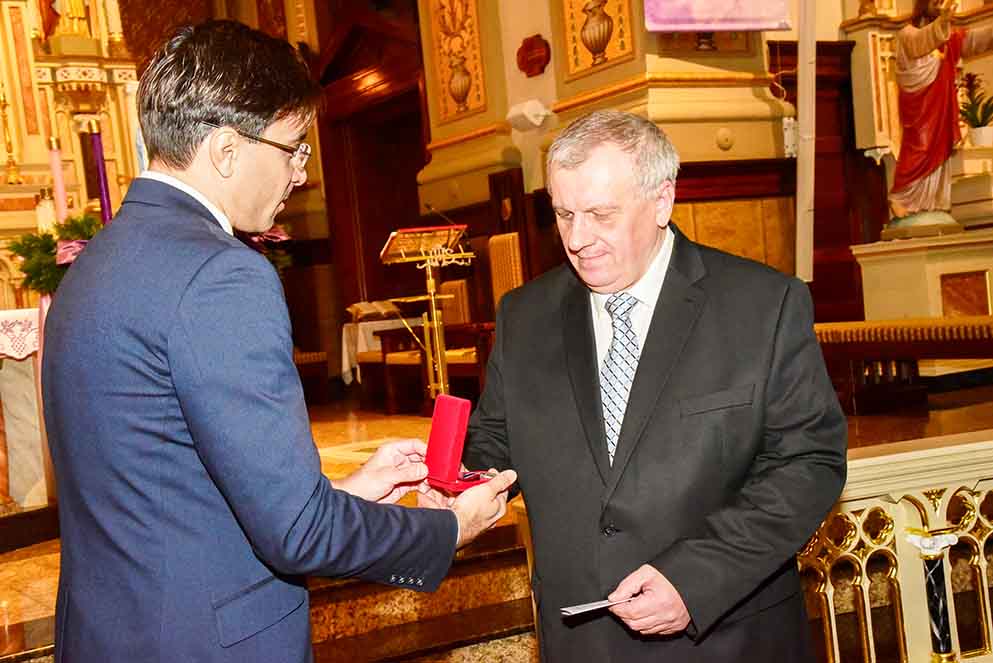
Consul Paweł Zyzak awards the Pro Patria Medal . (Photo by A. Baraniak)
One thing is enough: I managed to create, together with the owners, of course, who spared no expense, two daily newspapers that dominated the market in their time and went down in history. What's more, they went far beyond Chicago. I often joke that the effectiveness of Polish journalists in Chicago ends with Schaumburg. This is a suburb west of Chicago that can be taken as a symbol of the importance of the Polish media in this city, i.e. they were unable to leave their own backyard. Łucja Śliwa was known here for 30 years, she had her own group of truly loyal listeners, but no one had heard of her outside Chicago. The Trade Union Journal may last another 100 years, but no one in New York, Boston or Florida will pick it up. That's why I regret that my last project, internet television, failed because the investor withdrew after half a year for health reasons. This reached Polish diaspora across America and engaged local Polish communities. It was a different quality and a different scope. This is what we need, such a medium. There is a need for a combination of good texts and images, a need for discussion, and not the voices on the radio or the Internet of dilettante political experts and infantile healers of everything, who are listened to by the Polish ghetto in one city — and not the entire one at that. But to "go beyond Schaumburg" you need to know the craft. Unfulfilled actors or singers, domestic and dental helpers, and house or herb sellers — with full respect — will not manage this.
WB: Thank you, Mark, for the interview. Finally, I would like to express some opinion. Among the representatives of émigré journalists there is a long list of people who have never been appreciated for their work. It should be emphasized here that work for Poland is almost always treated by this group of people as a mission towards the Polish Nation. We do not expect any appanages or applause in return. A simple: thank you would be enough.








